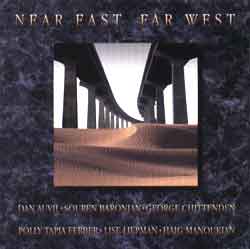Review / Description
Souren Baronian, of Armenian parentage, grew up in New York City’s Spanish Harlem surrounded by music, including the sounds of both jazz and Middle Eastern music. His own musical ambitions were inspired when, as a teenager, he used to sneak into the jazz clubs of 52nd Street and listen to the great musicians of the day. He studied jazz for many years with the master teacher Lennie Tristano. At about the same time, Souren began to study G-clarinet with the Turkish master Safet Glindeger, who was then playing in the 8th Avenue Greek clubs. Souren has always remained equally enamored of both Middle Eastern music and Western jazz. He has performed live and recorded with numerous distin-guished musicians from both his musical bags, including Phil Woods, Joe Beck, Paul Motian, Don Cherry, Caria Bley, Oudi Hrant, Mustafa Kandirali, Kadri Sencalar, and Tasos Halkias. Today Souren remains an unstoppable and inspirational musical force. He travels most of the year, teaching reeds and percussion at workshops across the US and in Europe and maintaining a full concert schedule with his trio Transition and with the current incarnation of Taksim.
Polly Tapia Ferber was introduced to Middle Eastern music in 1972. She met two generous musicians who gave her her first doumbek (an hourglass-shaped hand drum), and she was soon playing for the local Armenian, Greek, and Arabic communities. She has toured in Greece, Spain, Morocco, Israel, and Egypt. Polly teaches regularly at several music and dance camps and has gained recognition as both a teacher and a performer throughout the United States. She is the percussionist in the Middle Eastern trio Transition. Polly is also founder and director of Hand Springs Productions, an organization based in Santa Fe, New Mexico that presents music and dance from the Middle East and the Balkans, as well as various touring artists.
Haig Manoukian, born of Anatolian Armenian parentage in Virginia, now resides in New York From the age of five Haig was listening to Turkish and Armenian music on his parents’ 78 rpm records. He began playing oud (a fretless 11-string instrument) at the age of 18, learning makams from the kanun players he performed with. He is widely regarded as an exceptional player of the oud and has worked with many influential musicians of Turkey, Armenia, Egypt, and Iran. Haig has played at Lincoln Center and Carnegie Hall and at major cabarets throughout the US, and frequently performs with Middle Eastern dance companies. He has also toured extensively in Europe with Souren Baronian’s band Taksim as well as with the Transition trio and other small ensembles.
Lisa Liepman began her involvement with Balkan music in 1976 in the vibrant dance scene of the San Francisco Bay Area. She was a member and director of Westwind International Folk Ensemble for many years. At a Balkan music and dance camp Lise first heard the sound of the santouri (Greek hammered dulcimer) and was hooked. She began studying santouri with the Philadelphia-based musician Yiannis Roussos. She and her husband George Chittenden moved to Athens, Greece, where she continued her studies with the master musician Tasos Dhiakogiorgis. Lise plays santouri, accordion, and baglama with George and Dan in the bands Ziyia and Edessa and has toured internationally with the band Rebetiki Parea. She has taught santouri at Balkan music workshops on both the west and east coasts as well as in Hawaii.
Dan Auvil was first exposed to this type of music when he began folk dancing as a college student in the San Francisco Bay Area and was instantly drawn to the new melodies and foreign instruments. Dan was especially drawn to the large two-headed drum called tupan or davul. He met George at these events and soon they were playing live music for a small dance group Over the years his skill and reputation have grown I considerably. He is known as a “dancers” drummer and is in constant demand, including opportunities to play with the Eastern European recording artists he’s enjoyed for years. Dan also teaches tupan at the annual Balkan Music and Dance Camp in Mendocino, California.
George Chittenden has been playing Balkan and Near Eastern music since the mid-1970s, having previously become familiar with the music through his experience as a dancer and performer. He has studied music extensively abroad, focusing primarily on regional dance music of northern Greece and Anatolian Turkey. This has included traveling to remote corners of both countries to experience the social celebrations in which music plays such a central role, as well as learning regional styles from both rural and professional musicians. George performs regularly for ethnic communities and for folk music and dance events throughout the country and has toured abroad. He lives in the San Francisco Bay Area with his wife Use and plays with two bands; Ziyia, a traditional Greek dance ensemble featuring regional instruments, and Edessa, known for playing high-energy dance music of the southern Balkans.

